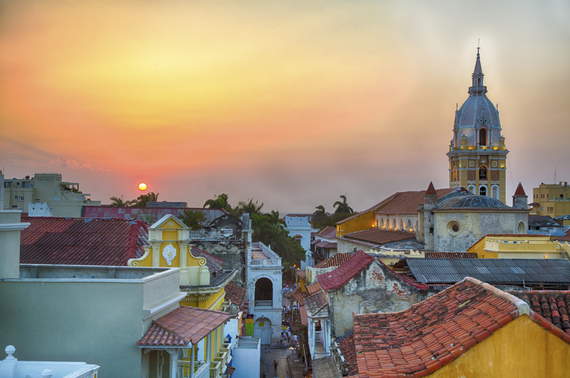Given the mayhem occurring around the world and the first votes in the 2016 Presidential election at home, my guess is the celebration today of the 15th anniversary of a milestone partnership between Colombia and the U.S. will be largely ignored.
That's unfortunate because the recent history of our two countries offers important lessons in ways the U.S. can apply economic, military and diplomatic pressure in a bipartisan effort to successfully nation-build and fight terrorism in a state virtually overrun by narco-terrorism.
Colombia is now one of America's strongest allies in the hemisphere, status that would have been unthinkable not too long ago.
In a few months, the Colombian government is expected to sign a peace agreement with the FARC, the large guerrilla, drug trafficking and terrorism organization that once controlled vast swaths of the country and inflicted enormous violence on Colombia for five decades.
The peace agreement has its roots in Plan Colombia, a plan developed by the U.S. and Colombian governments in 1999 during a particularly violent period in Colombia's history. The goal was to strengthen Colombia's security forces to take on the drug trafficking organizations that were crippling the country and responsible for most of the illegal drugs flooding the United States. We did that by training Colombia's military, sharing intelligence with them and providing helicopters and fixed winged aircraft, so Colombian forces could reach the traffickers and their operations in remote regions of the country.
Colombia's system of justice was literally under attack - guerrillas invaded the nation's Supreme Court in 1985, killing more than 100 people, including 11 members of that court - so we helped train and equip security forces to provide protection for those who administered justice.
Plan Colombia helped the Colombian government take the fight to the FARC as well as to other paramilitary groups engaged in trafficking and violence. The fight was a long one, but four years ago negotiations began and the demobilizing and disarming of the FARC is now at hand.
The plan also enabled Colombia and the United States to look beyond security issues to strengthen their bilateral relationship. One result was a free trade agreement between the two countries that has expanded trade and investment.
President Obama and Colombian President Juan Manuel Santos will recognize the 15th Anniversary of the launch of Plan Colombia in Washington today. There are three lessons relevant to future U.S. foreign policy engagements. First, bipartisan and sustained American commitment can make a difference in a failing state. With strong support from Democrats and Republicans, Plan Colombia was launched by President Bill Clinton, approved by a Republican-majority Congress in 2001 and continued by Presidents George W. Bush and Barack Obama.
A second lesson relates to effective nation building, an issue much debated in Washington during U.S. engagements in Afghanistan, Iraq and other trouble spots. With equally strong backing by successive Colombian governments, Plan Colombia was conceived and implemented with Colombians taking the lead and investing in their own country and future. U.S. support was critical, to be sure, but it wasn't imposed on Colombians by the United States. As a result, it stands as the most successful example of U.S.-led state building in modern times.
Finally, the Colombian experience shows how a successful campaign against terrorism can be conducted. The FARC was a formidable organization. Its armed forces had sophisticated weaponry, resolute guerrillas and drug traffickers, and billions of dollars from the illegal drug trade to wage their war against Colombian society. Despite those assets, a Colombian government and people willing to stand and fight for their country weakened them. The U.S. provided support, training and resources, but Colombians did the hard, painful work of taking back their country.
Today in Washington, some of us will recognize what has emerged: a nation that persevered and prospered; a neighbor Americans can be proud to have supported. It will be unfortunate if we don't notice this achievement in American diplomacy, and a tragedy if we don't to learn from it.
Jack Leslie last month received the Order of San Carlos, Colombia's highest award presented to a non-citizen, for outstanding contributions to the Colombian nation.

